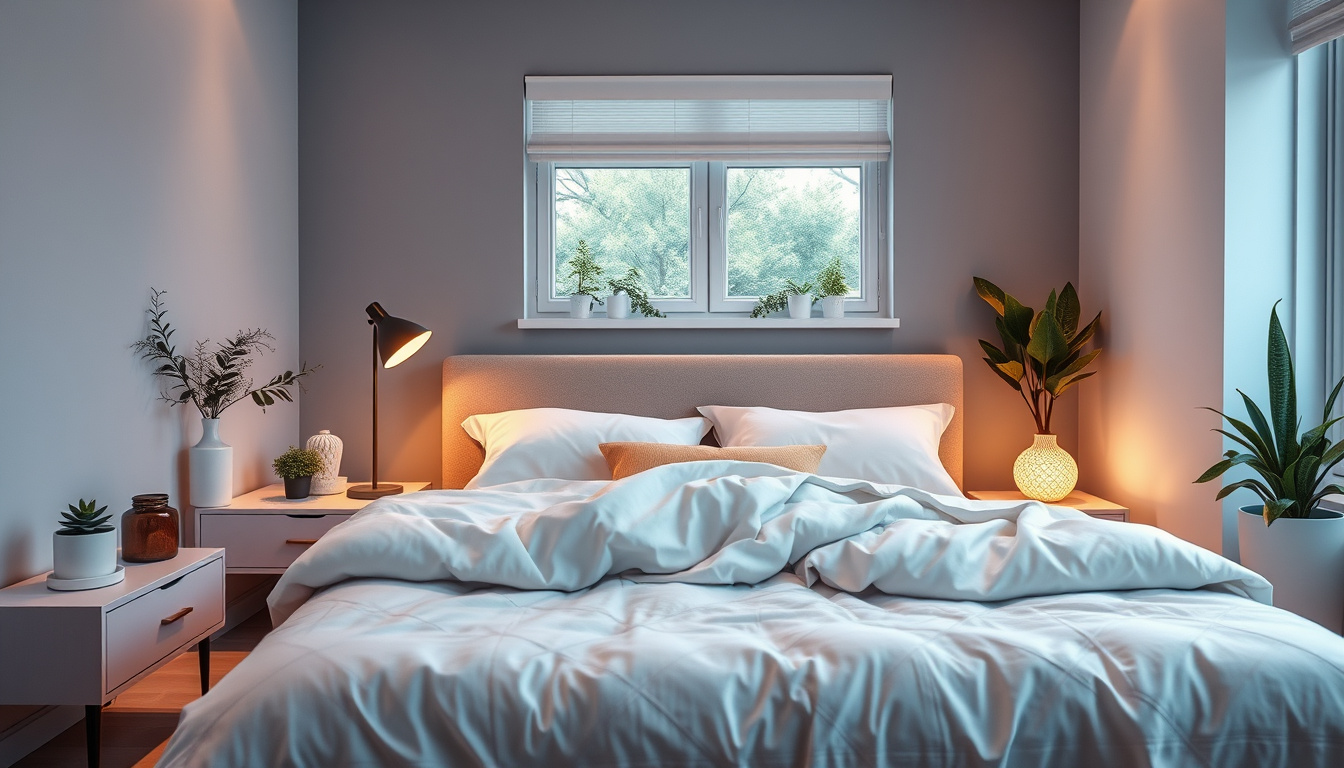
06 Apr 10 Essential Tips to Improve Sleep Quality for a Restful Night
A good night’s sleep is vital to our overall health and well-being, yet many people struggle to achieve sufficient rest. The quest to improve sleep quality is common among individuals who face various challenges, from stress and anxiety to an unstructured sleep routine. Understanding how to enhance your sleep can lead to better physical health, improved mental clarity, and elevated mood. In this article, we will explore ten essential tips to improve sleep quality, focusing on effective strategies that include healthy sleep hygiene practices, creating a suitable sleep environment, and making beneficial lifestyle changes. Whether you’re wrestling with insomnia or simply wish to elevate your night-time routine, these tips will empower you to drift into a restful slumber and awaken rejuvenated.

Key Takeaways
- Understanding sleep quality is crucial for overall health and well-being.
- Good sleep hygiene practices can significantly improve restfulness and sleep quality.
- Creating a comfortable and dark sleep environment is essential for a good night’s sleep.
- Implementing lifestyle changes such as regular exercise and a balanced diet can enhance sleep quality.
- Natural remedies like herbal teas and relaxation techniques can help in achieving better sleep.
Understanding Sleep Quality: What It Means
Understanding sleep quality is essential for anyone looking to enhance their overall health and well-being. Sleep quality refers to how well you sleep, encompassing aspects such as the duration of sleep, its depth, and how restorative it is. High-quality sleep is crucial for cognitive function, emotional regulation, and physical health. To improve sleep quality, it is vital to create a conducive sleep environment and establish a bedtime routine that promotes relaxation. Factors like room temperature, noise levels, and the comfort of your mattress can significantly impact your sleep. Moreover, limiting screen time before bed and managing stress through mindfulness practices can lead to more restful sleep. By focusing on these factors, individuals can work towards not only improving their sleep quality but also enhancing their daily performance and quality of life.
The Impact of Sleep Hygiene on Restfulness
Sleep hygiene refers to the habits and practices that are conducive to sleeping well on a regular basis and is essential for anyone looking to improve sleep quality. Good sleep hygiene can have a remarkable impact on an individual’s restfulness and overall health. By implementing simple strategies such as maintaining a consistent sleep schedule, creating a restful environment, and avoiding stimulants before bedtime, you can greatly enhance your sleep quality. For example, keeping your bedroom cool, dark, and quiet can help your body relax and prepare for restorative sleep. Additionally, engaging in relaxation techniques, such as meditation or gentle yoga, can further aid in reducing stress and promoting a state of calmness that is conducive to falling asleep. By prioritizing sleep hygiene, you not only improve your restfulness but also enhance your cognitive function, emotional regulation, and overall well-being.
‘Sleep is the best meditation.’ – Dalai Lama

Creating a Sleep-Conducive Environment
Creating a sleep-conducive environment is essential for anyone looking to improve sleep quality. Start by ensuring that your bedroom is cool, quiet, and dark. A temperature between 60 and 67 degrees Fahrenheit is generally considered ideal for sleep. Use blackout curtains to block out any light, and consider white noise machines or earplugs to mitigate distracting sounds. Furthermore, invest in a comfortable mattress and pillows that support your preferred sleeping position. Decluttering your space can also play a significant role—removing unnecessary items can foster a sense of calm conducive to sleep. Finally, incorporating calming scents like lavender through essential oils or candles can greatly enhance the atmosphere, making it easier to unwind and ultimately improving your overall sleep quality.
Lifestyle Changes to Enhance Sleep Quality
In today’s fast-paced world, many people struggle with getting sufficient rest, which can significantly impact overall health and well-being. If you want to improve sleep quality, making some simple yet effective lifestyle changes can be incredibly beneficial. First, establish a consistent sleep schedule by going to bed and waking up at the same time every day, even on weekends. This helps regulate your body’s internal clock. Next, create a relaxing bedtime routine free from screens; consider activities like reading or taking a warm bath to signal to your body that it’s time to wind down. Additionally, examine your sleep environment: keep your bedroom cool, dark, and quiet to encourage restful sleep. Engaging in regular physical activity can also help improve sleep quality, but try to avoid vigorous exercise close to bedtime. Lastly, pay attention to your diet; consuming heavy meals, caffeine, or alcohol in the hours leading up to sleep can disrupt your rest. By implementing these lifestyle changes, you can dramatically enhance your sleep quality and feel more rested and focused during the day.

Natural Remedies for Better Sleep
If you’re struggling with sleepless nights and seeking ways to improve sleep quality, natural remedies may provide an effective solution. From calming teas to soothing scents, there are various holistic approaches that can foster a peaceful sleep environment. Herbal teas, such as chamomile or valerian root, are known for their calming properties and can help signal to your body that it’s time to wind down. Incorporating a nighttime routine that includes relaxation techniques like deep breathing or gentle yoga can also significantly enhance your ability to fall asleep faster. Furthermore, using essential oils, such as lavender or cedarwood, may promote relaxation when diffused in your bedroom or added to your bath before bed. These simple yet powerful natural remedies not only help improve sleep quality but also contribute to overall well-being, making you feel more refreshed and revitalized in the morning.
When to Seek Professional Help for Sleep Issues
When it comes to improving sleep quality, many people overlook the signs that it might be time to seek professional help. If you find yourself struggling to fall asleep or stay asleep despite trying various remedies, it may be an indication of a deeper issue. Consider consulting a sleep specialist if you experience persistent insomnia, excessive daytime fatigue, or sleep disturbances that impact your daily life. Additionally, if lifestyle changes such as adjusting your bedtime routine, reducing screen time before bed, or implementing relaxation techniques do not yield positive results, a professional can provide personalized strategies to address any underlying sleep disorders. Remember, prioritizing your sleep health is essential for overall well-being, and seeking help is a proactive step towards improving sleep quality.

Sorry, the comment form is closed at this time.